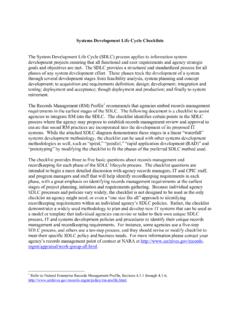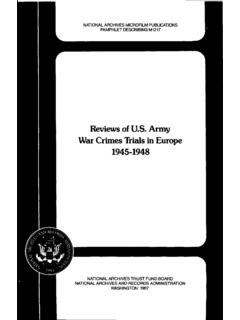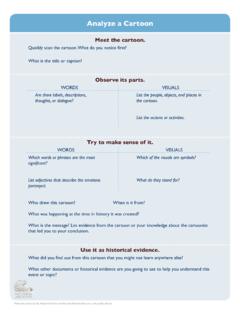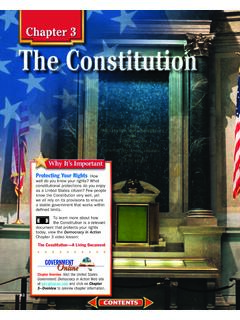Transcription of Understanding Federalism - Archives
1 Understanding Federalism Center for Legislative Archives National Archives and Records Administration Worksheet 1: Answer Key Term Definition Visual Representation Name of Where I Live Federal Government the organization through which political authority is exercised at the national level, government of the United States (Hierarchy with Federal above States) United States State Government the organization through which political authority is exercised at the state level, government of a specific state (Hierarchy with State above Counties) Florida Local Government the governing body of a municipality or county (Appropriate local hierarchical structure with, perhaps County above community) Local town Understanding Federalism Center for Legislative Archives National Archives and Records Administration Worksheet 2 Worksheet 2 Directions: 1.
2 Identify the level of government relevant to each example and write the letter of your choice in the appropriate space in the diagram to the left. a. The many small children who live on your neighborhood street love to play outdoors. Unfortunately, the traffic on your street moves too fast, creating a safety hazard. You would like to have a sign installed warning drivers to slow down and watch for children at play. Which level of government would you contact? Local b. You served in the Army for eight years and are planning to attend college on the Bill (a college scholarship provided by the government to military veterans). Which level of government would you contact to make sure you receive your Bill benefits? Federal c. You have just moved from Casper, Wyoming to Tallahassee, Florida, and you need a driver s license.
3 Which level of government would you contact? State 2. Write a one-sentence explanation of Federalism based on these three examples. Answers may vary, but a successful answer would describe a system of overlapping federal, state and local governments. This diagram shows three levels of government with the citizen represented by a star. Each example on the right presents a situation that might affect: people in one town or county people in one state, such as Florida or Texas people from all 50 states and the territories of the United States Federal A B C State Local Understanding Federalism Center for Legislative Archives National Archives and Records Administration 1 Worksheet 3: Answer Key Federalism has not had one set definition throughout history, because the idea of the appropriate balance of authority among the local, state, and Federal governments has changed over time.
4 Federalism is not specifically defined in the Constitution, but it is suggested in how the national government is described. This worksheet contrasts the first Constitution for the United States, written just after the colonies had declared their independence from Great Britain, with the one adopted by the Founders in 1787. Directions: Read each preamble and answer the questions below. Preamble of articles of confederation (1777) To all to whom these Presents shall come, we, the undersigned Delegates of the States affixed to our Names send greeting. Whereas the Delegates of the United States of America in Congress assembled did on the fifteenth day of November in the year of our Lord One Thousand Seven Hundred and Seventy Seven, and in the Second Year of the Independence of America agree to certain articles of confederation and perpetual Union between the States of New Hampshire, Massachusetts-bay, Rhode Island and Providence Plantations, Connecticut, New York, New Jersey, Pennsylvania, Delaware, Maryland, Virginia, North Carolina, South Carolina, and Georgia in the Words following, viz.
5 articles of confederation and perpetual Union between the States of New Hampshire, Massachusetts-bay, Rhode Island and Providence Plantations, Connecticut, New York, New Jersey, Pennsylvania, Delaware, Maryland, Virginia, North Carolina, South Carolina, and Georgia. (Source: ) 1. Create a diagram illustrating the government described in this preamble. The diagram should show the states all on one level in a circle - with the Federal government in the center of them. The key fact to be depicted is that the relationship between the Federal government and the states is not hierarchical but the Federal government acts as the agent of the states with all its action subject to the approval of all the states. 2. What is the name of the government created in this preamble? The United States of America 3.
6 Who were the partners creating this union? The listed states 4. What relationship of the states to the Federal government is suggested in this preamble? The relationship between the Federal government and the states is not hierarchical but the Federal government acts as the agent of the states with all its action subject to the approval of all the states. Understanding Federalism Center for Legislative Archives National Archives and Records Administration 2 Worksheet 3: Answer Key Preamble of Constitution of the United States (1787) We the People of the United States, in Order to form a more perfect Union, establish Justice, insure domestic Tranquility, provide for the common defense, promote the general Welfare, and secure the Blessings of Liberty to ourselves and our Posterity, do ordain and establish this Constitution for the United States of America.
7 (Source: ) 5. Create a diagram illustrating the government described in this preamble. The key fact to be depicted in this diagram is that the people, in general not as citizens of various states, have formed the United States of America. The states are not mentioned. 6. What is the name of the government created in this preamble? The United States of America 7. Who were the partners creating this union? The People 8. What relationship of the states to the Federal government is suggested in this preamble? The states are not mentioned, indicating that the People have formed a union over and above their citizenship within states. Summary Directions: Examine the dates of the two excerpts and write a one-sentence response to each of the following questions: 1. How is the role of the states different in the two preambles?
8 Under the articles of confederation the states were the partners to the union and had power over the action of the federal government. The relationship of the states to the Federal government was not mentioned in the Preamble of the Constitution 2. Does the difference in the role of the states suggest a change in the meaning of Federalism ? Explain. Federalism under the articles of confederation meant that all states had to agree to each action of the Federal government in order for the Federal government to act. The role of the states and their relationship is not spelled out in the Preamble of the Constitution. Understanding Federalism Center for Legislative Archives National Archives and Records Administration Worksheet 4: Answer Key The list of powers granted to and denied to the Congress in article I, and the powers reserved by the 10th Amendment of the Constitution serve as an outline of Federalism .
9 Directions: Read the following excerpt from the Constitution. Label each power E if it represents an enumerated power (granted to the Federal government); D if it is a denied power; or R if it is a reserved powers. article I, section 8 Each power listed in this section is an enumerated power. article I, section 9 Each power listed in this section is a denied power. TENTH AMENDMENT The Tenth Amendment does not list any specific powers. Instead, it broadly says that all powers not given to the national government are reserved for the states and the people. This leaves the meaning of reserved powers open to interpretation in the states. Examples of powers that belong to the states: 1. The power to run elections 2. The power to set up and run schools Check Your Understanding : A.
10 Which clause of article I, section 8 do you think has the greatest influence on the discussion of Federalism ? The answers can vary, but the most solid case might be made for article I, section 18 To make all Laws which shall be necessary and proper for carrying into Execution the foregoing Powers, and all other Powers vested by this Constitution in the Government of the United States, or in any Department or Officer thereof. B. In what ways might the Tenth Amendment influence the interpretation of the Enumerated Powers? The Tenth Amendment suggests that the states have undefined powers reserved to them. Determining the extent of the authority reserved to the states by this amendment has been a long-running debate in history. Understanding Federalism Center for Legislative Archives National Archives and Records Administration 1 Worksheet 5: Answer Key This worksheet draws on two famous pieces of legislation that shifted the balance of authority between the Federal government and the states during the 20th century.










